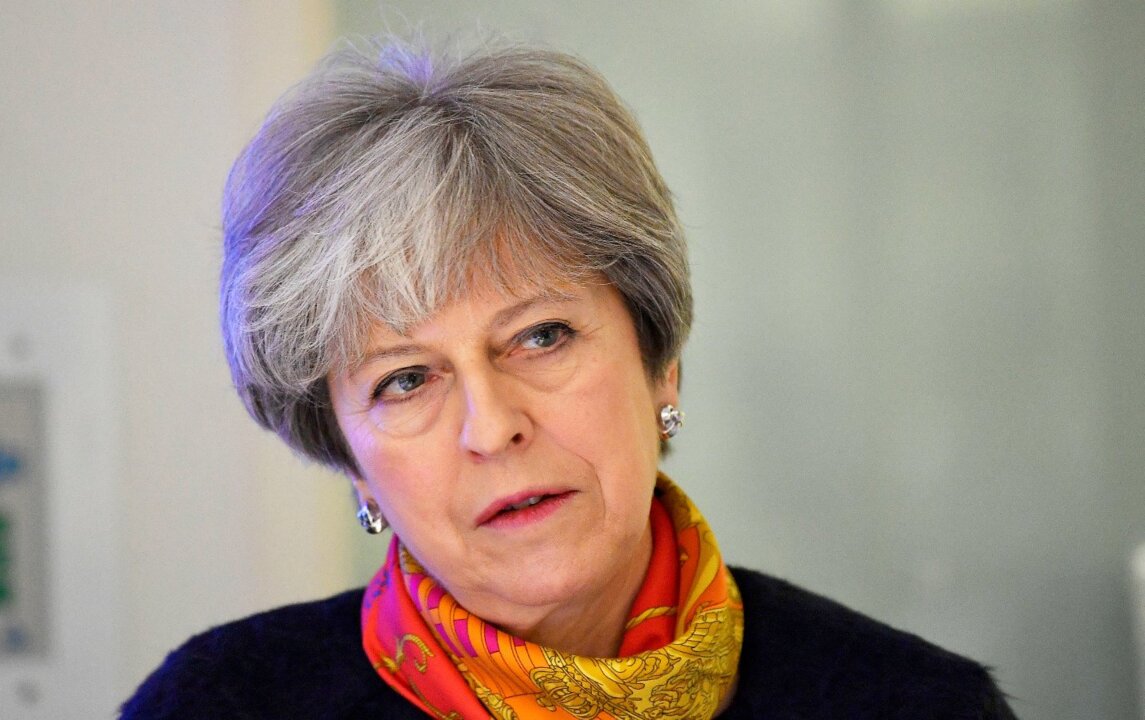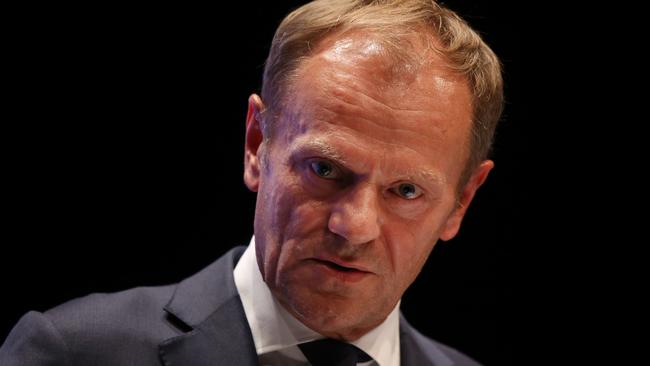Brittle and blunt, Theresa May and her officials had no inkling of the ambush about to engulf them
It was mere minutes before facing the cameras in Salzburg that the PM discovered the scale of the EU humiliation about to befall her.

IT was less than 20 minutes before facing the cameras in Salzburg that Theresa May discovered the scale of the EU ambush about to befall her.
Huddled in front of an aide’s iPad propped up on a table in the British delegation room, she watched as Donald Tusk read from a prepared script pronouncing the death of her Chequers blueprint in nine words. “The suggested framework for economic co-operation will not work,” he said bluntly.
No one in the room had any inkling it was coming, certainly not the prime minister who had talked with Mr Tusk 30 minutes before. Not Oliver Robbins, her chief Brexit negotiator, who was sitting next to her and who had had responsibility for masterminding the summit strategy. Nor Sir Tim Barrow, her EU ambassador, whose job it was to be her eyes and ears on the ground.
As soon as the words were out of Mr Tusk’s mouth, no one was in any doubt what needed to happen. Prepared talking points for her press conference about a constructive meeting with the EU council president were dropped. Instead, Mrs May described the meeting as “frank” - code she and her aides knew the press would interpret as a row - even though none had taken place.
It was the best she could do to mitigate what everyone in the room knew was a disaster that would undermine her domestic authority and strengthen the hand of Brexiteers. But how did they get there? Was she deliberately blindsided and humiliated by the normally anglophile Polish diplomat?
What had happened in the lunchtime meeting of the EU 27? Mrs May was not there, of course, but in the delegation room eating the same pumpkin, ginger soup and smoked salmon from a menu that the other leaders were having downstairs. Where did the brutal assault on her Chequers proposals leave the substance of the negotiations and the prospect of a no-deal Brexit?
Salzburg began to go wrong from the moment Brexit was first discussed. During the formal dinner the night before Mrs May set out her stall when she addressed the other 27 leaders shortly after midnight. Her remarks had been prepared in advance but senior EU diplomats said they were disastrously miscalibrated.
Rather than talk about compromise, one said, she sounded like she was speaking to a British domestic audience. She spoke about her Chequers proposals being the only basis for a deal despite knowing the reservations that many in the room had about them. At one point she began reading out an article she wrote for Die Welt in Germany. Everyone in the room knew what she had written and were irritated at what they saw as a clumsy attempt at public diplomacy.
In private, Mrs May gave no indication that she realised that compromises to Chequers would be necessary let alone suggesting where they might come. This jarred - particularly with President Emmanuel Macron - but also other leaders more favourably inclined to the British.
Mrs May’s other mistake was to use the dinner to reject outright Michel Barnier’s attempt to “dedramatise” the Irish backstop issue. “May’s blunt rebuff of a Barnier border dedrama and her ‘it is Chequers or nothing’ [article] in Die Welt and at dinner, forced leaders to be more outspoken,” a European diplomat said. “It’s a misunderstanding on both sides of the Channel on the degree to which the other side is serious.”

One old Whitehall hand at European Council negotiations put much of the blame on Mr Robbins for not anticipating how her remarks would go down. Nor did he alert her to the dangers the following day. “You need to pick up any and all signs of trouble, and tell your principal exactly where they are and what might be afoot,” he said. “You have to be totally on it, and alive to every nuance you pick up. Most people close to the negotiations see the bulk of the fault to be with the prime minister’s top team. Neither side listens. Both misread and miscalculate. Both are arrogant. But London is worse on all counts at the moment. And that’s avoidable.”
Others in Whitehall think this is unfair. Mrs May has long had a reputation for being inflexible and failing to add nuance to her private messages. One source said that Mr Robbins had warned Mrs May that Salzburg might be a disaster, but the prime minister and her political aides were unwilling to take heed. Turning the blame-game finger at Robbie Gibb, her director of communications, and Gavin Barwell, her chief of staff, as well as at the PM, one said: “It’s easier to be optimistic when you’re not the one talking to people like Sabine Weyand (Mr Barnier’s deputy) and the member states.”
However it happened, the EU 27 went into their private lunch to discuss Brexit less willing to provide words of comfort to help Mrs May domestically. A number of senior sources stressed that neither were they furious nor looking to humiliate Mrs May.
A picture taken and posted on Mr Tusk’s Instagram account before the meeting showed Mrs May at a cake stand with a caption saying “no cherries” - a reference to EU criticism of Chequers as cherry-picking the single market. Afterwards it was interpreted as another intended slight to humiliate the prime minister, who, as a diabetic, does not eat cake. EU figures stressed that it was intended as a joke and, in hindsight, had gone down just as badly in European delegations as it had in London.
Regardless, at the EU 27 meeting, the mood turned against Mrs May. Concerned about the short amount of time left to do a deal, they were alarmed to hear from their sherpas that Mr Robbins had told them that further concessions from Britain were not imminent.
At an earlier meeting with Leo Varadkar, the Irish prime minister, Mrs May did not commit herself to a date to come forward with alternative proposals for the Irish backstop - seen by the EU as a critical piece of the jigsaw.
President Macron said that the EU council needed to send a clear message that Chequers was not the basis for a deal. London, he said, should not be left under the illusion that if they strung the process along it would be the EU that would compromise. Mr Varadkar is said to have weighed in arguing that maximum pressure must be put on London to move fast. He and Mr Macron also stressed that London needed to be told clearly and publicly that they could not attempt to split the EU and sideline Mr Barnier, who was at the lunch. The European commission have long believed that this has been the British game plan and Mr Barnier stressed that this could not be allowed to happen. The message was not that Chequers was not the basis of a deal, as it was later portrayed, more that it needed to be refined and the British taught a lesson.
One senior EU ambassador said that, in private, the view of many countries is that the EU will live with Mrs May’s plan for a common rule book but that it cannot be called that and Britain needs to agree to follow new EU social and environmental legislation as well. On customs, the EU is prepared to accept in principle that technology could allow frictionless trade across the channel while letting Britain sign its own free trade deals. But they want a guarantee that until they are happy with the system, which could take years to hone, the UK would remain in the customs union. This is the basis of a Chequers-style deal - but it is not Chequers as written down in black and white in the government’s white paper.
The real problem, multiple sources said, was not so much the decision to send a warning shot across Mrs May’s bow, but the choice of words Mr Tusk used to convey the sentiment. They were quickly drafted in between his meeting with Mrs May and his own press conference. Nobody read them carefully enough. Overall, his statement was tough but not enough to cause the row that ensued.
They knew they needed to repair the damage which led directly to Mr Tusk’s rather more conciliatory statement issued on Friday.
The episode has left both sides shaken and blaming mutual miscalculation rather than matters of real substance. Salzburg was supposed to set the scene to settle a final deal. Instead, British and EU officials are licking their wounds and trying to figure out a way forward.
By Oliver Wright, Policy Editor, Bruno Waterfield in Salzburg, Sam Coates, Deputy Political Editor, and Francis Elliott, Political Editor




To join the conversation, please log in. Don't have an account? Register
Join the conversation, you are commenting as Logout